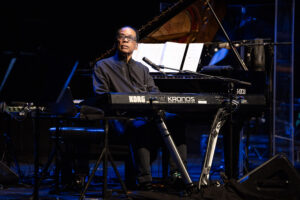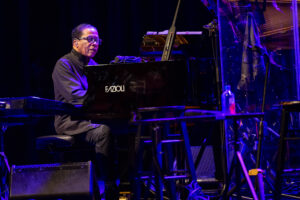Concert Hall, October 11
9/10
Herbie Hancock has never made music: he’s always shared it. This was already the case when, aged 23, the pianist joined arguably Miles Davis’s greatest band, and created harmonic atmospheres that suddenly made jazz weightless, while still under maximum propulsion. Simultaneously, he became a notable composer and band-leader, and by the 1970s his artistry was ever more chameleonic. The floating piano chords with Miles gave way firstly to even freer explorations, then to a grinding electric funk that, when mixed with hip hop, even gave him a 1983 hit: Rockit.

But trying to define Hancock via idiom was like trying to tie knots in water. There was always a counter project; a new angle; a revisiting of the past that became a reinvention.
A review is not usually a biography, but this concert was itself autobiographical, not just because he revisited Maiden Voyage or Rockit, but because, after six decades in the forefront of jazz, it was a self-portrait of all that makes up the human as well as the musician.
Joining the harmonic weightlessness and sizzling propulsion were his primal, more climactic instincts and his sheer exuberance. The latter makes him seem three decades younger than his 84 years, reflected in his contagious joy in collaboration: a sharing that means his artistry is comprehensively filtered through the prism of his band.
 As on the last couple of visits, Lionel Loueke’s quicksilver guitar playing is central to the enunciation of that conception, and James Genus’s bass is the foundation that allows it to reach improbable heights. To have a leader and composer of the stature of trumpeter Terence Blanchard join the fold tells you much about the selflessness at play, and his funky rearrangement of Wayne Shorter’s Footprints was a highlight. Nor was it surprising that the drummer is someone to whom Hancock is passing the flame: the 26-year-old virtuoso Jaylen Petinaud, who was routinely the detonator to Hancock’s dynamite.
As on the last couple of visits, Lionel Loueke’s quicksilver guitar playing is central to the enunciation of that conception, and James Genus’s bass is the foundation that allows it to reach improbable heights. To have a leader and composer of the stature of trumpeter Terence Blanchard join the fold tells you much about the selflessness at play, and his funky rearrangement of Wayne Shorter’s Footprints was a highlight. Nor was it surprising that the drummer is someone to whom Hancock is passing the flame: the 26-year-old virtuoso Jaylen Petinaud, who was routinely the detonator to Hancock’s dynamite.
Were this just an appreciation of Hancock’s monumental contribution to music, it would inevitably warrant five stars – or more! The performance, however, was slightly compromised by the sound: a surprising lack of definition in the bottom end for the refurbished Concert Hall. And to hear Blanchard’s trumpet not electronically treated at least once would delightfully have further broadened an already expansive palette.